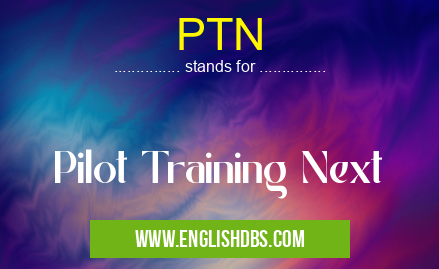What does PTN mean in UNCLASSIFIED
PTN stands for Pilot Training Next. It is a revolutionary training system developed by the United States Air Force (USAF) to enhance the training and readiness of its pilots. PTN employs advanced technologies, innovative instructional techniques, and a holistic approach to flight training.

PTN meaning in Unclassified in Miscellaneous
PTN mostly used in an acronym Unclassified in Category Miscellaneous that means Pilot Training Next
Shorthand: PTN,
Full Form: Pilot Training Next
For more information of "Pilot Training Next", see the section below.
Key Features of PTN
- Virtual Reality (VR) and Augmented Reality (AR): PTN utilizes VR and AR technologies to provide immersive and realistic training experiences. Trainees can engage in simulated combat scenarios, practice instrument procedures, and fly through various weather conditions without leaving the classroom.
- Adaptive Learning: PTN incorporates adaptive learning algorithms that tailor training programs to each trainee's individual learning style and progress. The system identifies areas where trainees need additional support and provides personalized guidance.
- Data Analytics: PTN collects and analyzes data throughout the training process to track trainee performance, identify areas for improvement, and optimize training plans. This data-driven approach allows instructors to make informed decisions and adjust training interventions accordingly.
- Enhanced Situational Awareness: PTN employs advanced simulation systems that provide a highly realistic cockpit environment, allowing trainees to experience complex scenarios and develop situational awareness. This enhanced realism helps trainees respond more effectively to real-world situations.
- Integrated Training: PTN integrates flight training with academic instruction, providing trainees with a comprehensive understanding of aviation principles and procedures. This holistic approach ensures that pilots are well-equipped to handle the demands of flying.
Benefits of PTN
- Improved Training Efficiency: PTN's innovative techniques and technologies streamline the training process, reducing the time it takes to train pilots.
- Enhanced Pilot Proficiency: PTN's immersive training environment and data-driven approach enable trainees to develop a higher level of proficiency in a shorter period of time.
- Reduced Training Costs: By utilizing simulation and virtual technology, PTN reduces the need for expensive live aircraft training, resulting in significant cost savings.
- Increased Safety: PTN's realistic training scenarios prepare trainees for potential hazards and emergencies, improving overall safety in the cockpit.
- Greater Flexibility: PTN's adaptive learning and virtual training capabilities allow for flexible training schedules and accommodate diverse learning styles.
Essential Questions and Answers on Pilot Training Next in "MISCELLANEOUS»UNFILED"
What is Pilot Training Next (PTN)?
Pilot Training Next (PTN) is a revolutionary flight training program developed by Boeing, the global aerospace leader. It is designed to transform the training and development of future pilots by integrating advanced technology, innovative learning methods, and real-world experience.
What sets PTN apart from traditional flight training programs?
PTN features several key differentiators that enhance the overall training experience:
- Technology Integration: PTN leverages cutting-edge flight simulators, virtual reality (VR) technology, and an innovative learning management system (LMS). These tools provide immersive and realistic training environments that accelerate pilot proficiency.
How does PTN approach flight training?
PTN adopts a holistic approach to flight training, emphasizing both technical skills and decision-making abilities. The program combines classroom instruction, simulator training, and in-flight practice to equip pilots with a comprehensive understanding of aircraft operations and aviation principles.
What are the benefits of participating in PTN?
PTN offers numerous benefits to aspiring pilots:
- Accelerated Learning: The integrated technology and innovative learning methods enable pilots to progress faster and retain knowledge more effectively.
- Reduced Training Costs: PTN's efficient training approach helps reduce the overall cost of flight training, making it more accessible to a wider range of candidates.
- Enhanced Safety: The realistic and immersive training environments prepare pilots for real-world situations, improving their safety awareness and preparedness.
Who can participate in PTN? A: PTN is designed for aspiring pilots who meet the following criteri
PTN is designed for aspiring pilots who meet the following criteria:
- Possess a strong interest in aviation
- Meet the minimum age and education requirements specified by the航空管理局
- Demonstrate aptitude for flight training through an assessment process
Final Words: PTN is a transformative training system that revolutionizes pilot training. Its innovative technologies, data-driven approach, and holistic curriculum provide trainees with a highly effective, efficient, and safe learning experience. By embracing PTN, the USAF is equipping its pilots with the skills and knowledge necessary to excel in the demanding and evolving field of aviation.
PTN also stands for: |
|
| All stands for PTN |
